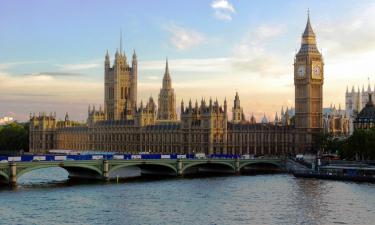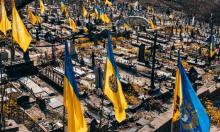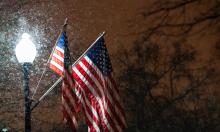Yugoslav Crowds Occupy Parliament - 5 October, 2000
Demonstrators took control of parliament, hurling pictures of President Slobodan Milosevic into the streets, and police fought protesters amid clouds of tear gas Thursday as hundreds of thousands of people swarmed Belgrade to demand that Milosevic accept electoral defeat, AP announces. Amid what was the largest anti-Milosevic protest since his 13-year rule began, fires burned inside the parliament building and the state-run television headquarters, one of Milosevic's propaganda mainstays. Demonstrators who stormed parliament quickly established control of the building, with police fleeing or surrendering. Protesters said dozens of police at the state TV building and at federal parliament had joined crowds taking control of both buildings. Shots were heard outside the TV studio. A bulldozer apparently commandeered by demonstrators then broke into the building, and demonstrators poured inside. Police fled out the back. Meanwhile, clashes spread through the streets of the capital, which echoed with the sound of stun grenades and tear gas fired to break up the crowds. Dozens of people were injured, according to witnesses, and the Beta news agency reported that ''several dozen'' were admitted to emergency wards. The melees erupted at the start of a huge rally the opposition called to force Milosevic to accept electoral defeat by Vojislav Kostunica in the Sept. 24 election. Hundreds of thousands of people had assembled in Belgrade, and tens of thousands more were seen streaming into the city. The fighting began when angry protesters charged the parliament building, pelting the doors with stones. Riot police responded with tear gas as the protesters broke through a police cordon and rushed into the building. Afterward, small fires were reported to be burning inside. By late afternoon, opposition supporters who had been inside the parliament building were climbing through the windows and onto the complex's balconies, waving flags as the crowd roared below. Inside the parliament building, chaos reigned. Gangs of young people, many of them intoxicated, were roaming the building, smashing furniture, computers and pictures and looting the rooms. A few ambulances were seen trying to take injured policemen to the hospital. Crowds of drunken youths could be seen stopping them and demanding the ambulance crews hand over the injured officers. Opposition leaders were trying to urge people to be calm but were getting little support. ''At this moment, terror rules in Belgrade,'' the pro-Milosevic government television said in a commentary. ''They are attacking everyone they see on the streets and there is chaos.'' Afterward, the station switched to music videos. At the scene downtown, five police cars were set afire in the front of the parliament. The violence spread to several police stations, with demonstrators seen taking over at least two of them. Police seemed to be offering no resistance. Dozens of demonstrators escorted about a dozen terrified policemen who had surrendered at the TV building. The officers huddled together, and when the demonstrators asked them whether they liked Milosevic more than their own country, the policemen started shouting ''Serbia! Serbia!'' Some policemen were seen discarding their uniforms and fleeing. Others were seen embracing demonstrators. ''They're giving up,'' said a demonstrator who identified himself only as Sasha. Tensions were rising after the Yugoslav Constitutional Court issued a ruling that one justice reportedly said nullified the recent election. The opposition claimed the decision by the pro-Milosevic court was aimed at prolonging his stay in power. By early afternoon, downtown Belgrade was a mass of people, many streaming toward the parliament building and blocking traffic as they did so. People in the crowd waved flags, shouted and jostled each other in the streets. Many wore paper caps with the slogan, ''We'll Endure.'' They moved past shops, some shut down with signs stating, ''Closed because of Robbery'' -- an allusion to opposition claims that Milosevic stole the elections. Thousands more people joined smaller rallies in towns throughout the country. In the third largest city, Nis, about 10,000 people tried to push their way into the local office of Milosevic's party but were persuaded by opposition leaders not to give police a reason to attack them. The government acknowledged that Kostunica outpolled Milosevic but says he fell short of a majority in the five-candidate race. A run-off had been set for Sunday. Late Wednesday, the constitutional court, in a brief dispatch by the state-run Tanjug news agency, said ''part'' of the Sept. 24 election had been annulled. There was no comprehensive statement from the court. But one justice, Milutin Srdic, told Radio Free Europe that the entire election result had been thrown out and a new vote would be required. In the meantime, Srdic said Milosevic could remain in office through his term, which expires in July. The opposition said it had not been officially notified of the ruling. However, opposition legal expert Nebojsa Bakarec dismissed the decision as the latest ''in a series of unconstitutional moves'' by Milosevic ''to manipulate the electoral will of the people.'' The United States, Britain and other Western governments condemned the apparent move to extend Milosevic's tenure. ''The people of Yugoslavia have made their will known: Milosevic should not thwart them,'' Secretary of State Madeleine Albright said in Egypt. In Washington, White House spokesman Jake Siewert said the images of opposition protesters were ''a reminder that Milosevic had lost the support of the Serbian people.'' In what the opposition hoped was a further sign the regime was crumbling, more than 160 employees of Serbian state television -- a major pillar of Milosevic's power -- were fired Thursday after going on strike. Most were technicians and staff of nonpolitical programs. Most Milosevic loyalists remained, and kept the network on the air. Police had set up roadblocks outside Belgrade, but the convoys of protesters were so large that most of them were allowed to pass. A convoy of about 2,000 people was briefly blocked near the town of Smederevska Palanka, about 30 miles south of Belgrade, but it eventually pushed its way through barricades. Protesters used a front-end loader to shove aside two sand trucks used by authorities to try to block a 12-mile line of cars and buses with about 15,000 people traveling from the opposition stronghold of Cacak. Riot police stood by without intervening. At another roadblock, trucks were pushed away and demonstrators negotiated with a police commander to be allowed through. At yet another blockade, angry protesters overturned a police car and dumped it into a ditch. The mass march on Belgrade followed a day of dramatic developments at the strikebound Kolubara coal mine. Police there were forced to abandon plans to take over the compound after confronting fearless anti-Milosevic crowds.
Subscribe to Pravda.Ru Telegram channel, Facebook, RSS!





